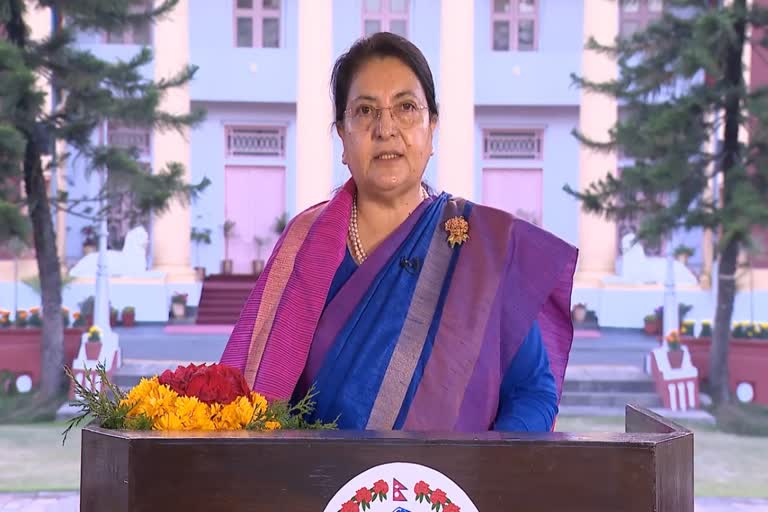Kathmandu: Asserting that the House of Representatives was dissolved as per the constitutional provisions, Nepal's President Bidya Devi Bhandari has told the Supreme Court that it cannot overturn her decision on the matter or subject it to a judicial review. President Bhandari, at the recommendation of Prime Minister K P Sharma Oli, dissolved the lower house for the second time in five months on May 22 and announced snap elections on November 12 and November 19. Prime Minister Oli is currently heading a minority government after losing a trust vote in the House.
President Bhandari, Prime Minister Oli and Speaker Agni Sapkota separately presented their clarifications in writing to the apex court on the government’s May 21 decision, The Kathmandu Postreported. The Constitutional Bench on June 9 had asked them to furnish their clarifications in writing. While the President and Prime Minister defended their decisions, Speaker Sapkota has called the House dissolution an unconstitutional move. Sheetal Niwas, the presidential office, even argued that the President’s decision cannot be a subject of judicial review.
Read: Court cannot appoint prime minister, says Nepal PM
“Any action carried out by the President as per Article 76 of the Constitution cannot become a subject of any petition and this cannot be an issue for a judicial review,” the President said in the clarification presented to the court through the Office of the Attorney General. “While taking the decision, the President ascertained whether the prime minister to be appointed as per the Article 76(5) could get a vote of confidence or not. This can be done only by the President and that’s exactly what the President did.”
President Bhandari referred to Clause 16 of the Remunerations and Benefits of the President and Vice President Act-2017 that gives immunity to the President. Clause 16 of the Act states that no cases would be prosecuted in any court of law on the actions taken by the President while administering his/her duties whether the person holds office or is retired.
Read: Nepal to procure 4mn vaccines from China under non-disclosure deal
“So the court cannot take any action on a decision taken by the President based on the Constitution without the recommendation of anyone,” President Bhandari asserted.“And the court cannot issue a mandamus order to appoint a certain person. To make such a demand itself is an issue against the Constitution.” Oli, 69, on his part, said government formation is a political process and that the court cannot decide on this matter.
“The court has the authority to interpret the Constitution, but it cannot play the role of the legislature or the executive,” said Oli in his response. "Forming governments based on parties’ claims is the fundamental characteristic of the parliamentary system. Our Constitution does not imagine party-less practices. If we run Parliament and the government as demanded by the petitioners, this could revive a party-less system like the Panchayat.”
Read: Indians among 20 missing in Nepal flash floods
As many as 30 petitions have been filed at the Supreme Court against Oli’s House dissolution move. One of them was filed by the opposition alliance led by Nepali Congress President Sher Bahadur Deuba. The court is set to start the final hearing from June 23, but it has said the hearing on other petitions would resume after finalising the petition filed by the opposition alliance. As many as 146 members, including 23 from the Madhav Nepal faction of Oli’s CPN-UML party, of the dissolved House on May 24, had filed the petition at the Supreme Court demanding restoration of the House and passing an order to appoint Deuba as prime minister.
